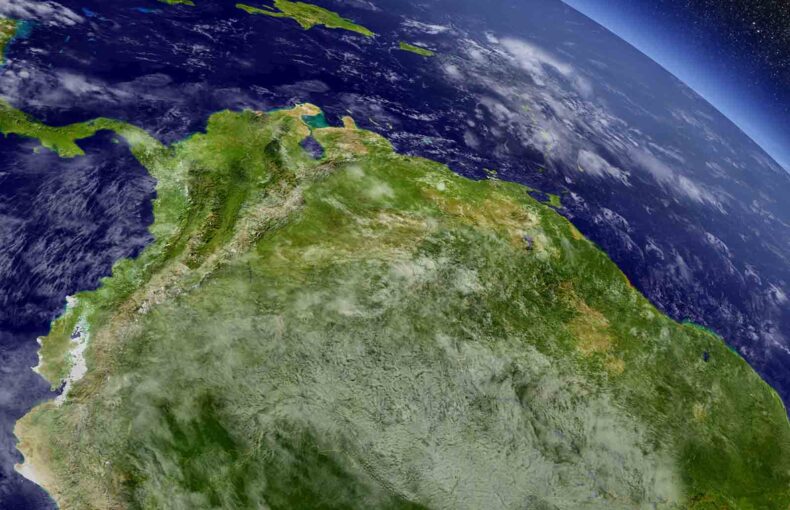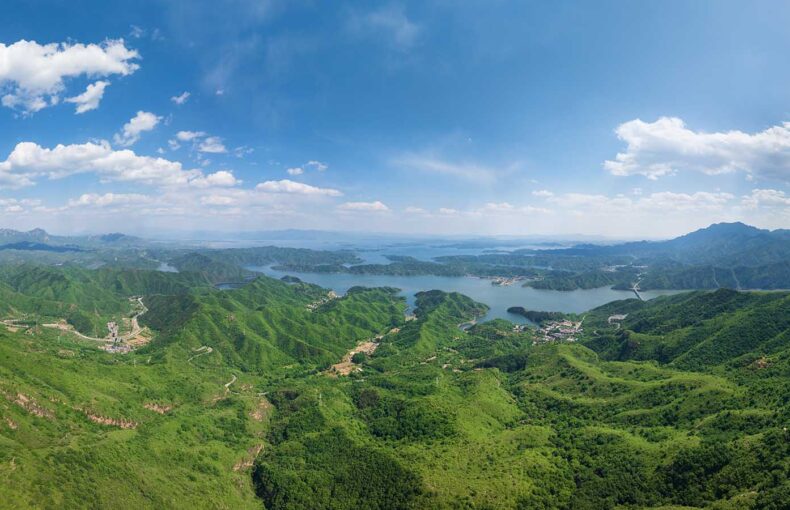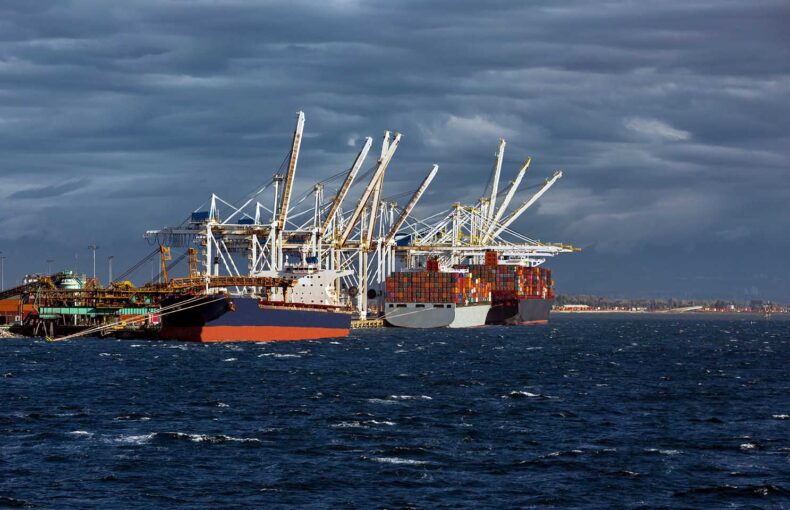Future-proofing agriculture: Spire’s Soil Moisture Insights and coffee plights
How Spire’s Soil Moisture Insights can help protect agriculture, supporting resilient farming in a changing climate
- Brazil, producing a third of the world’s coffee, faces severe droughts and irregular rains impacting its coffee-producing regions.
- Up to 50% of coffee-growing land may become unsuitable by 2050 due to climate change, according to the International Coffee Organization.
- Without adaptive measures, climate change could cost Brazilian agriculture billions in lost revenue annually; coffee exports contribute around $5 billion.
- Spire’s Soil Moisture Insights offer the data necessary to combat a changing climate.
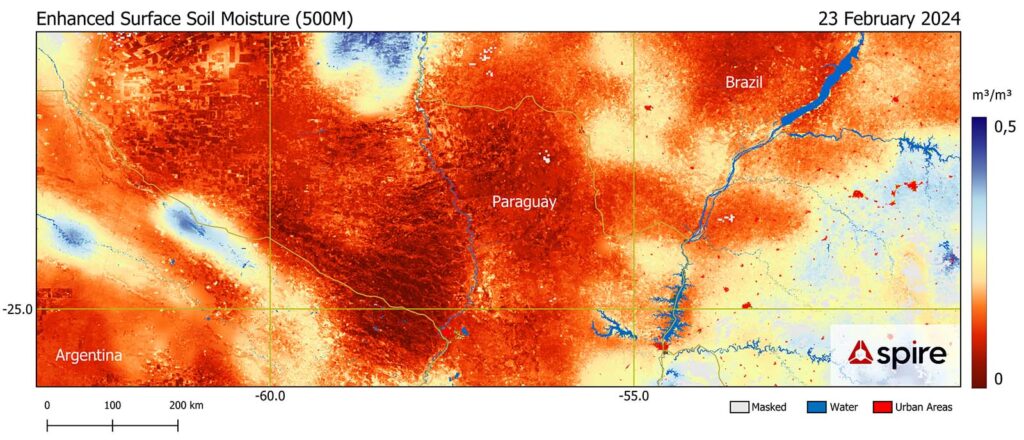
Spire’s daily surface soil moisture at 500-m resolution for February 23, 2024: This high-resolution image shows extreme dryness across regions of South America. According to NOAA, this February experienced record-high temperatures, contributing to a five-year span ending in February 2024 as the warmest on record. The unusual warmth has exacerbated drought conditions.
In the lush landscapes of Southern Brazil and the fertile plains of Uruguay, agriculture is not just an economic activity but the very pulse of the region’s culture and daily life. Among the diverse crops cultivated, coffee in Brazil stands out not only as a key commodity but also as a cultural heritage, deeply embedded in the region’s agricultural identity. However, this cherished legacy is now facing unprecedented challenges due to the changing climate, which is reshaping the yield, quality, and economic value of coffee and other significant crops.
The climatic challenges to Brazil’s coffee legacy
Brazil’s position as a global coffee powerhouse has been historically supported by its ideal wet and dry seasons. Yet, today’s climate change-induced erratic weather patterns, manifesting as severe droughts and excessive rainfall, pose significant threats. These conditions stress coffee plants, exacerbate diseases like coffee leaf rust, and demand innovative farming practices for the sustainability of coffee production.
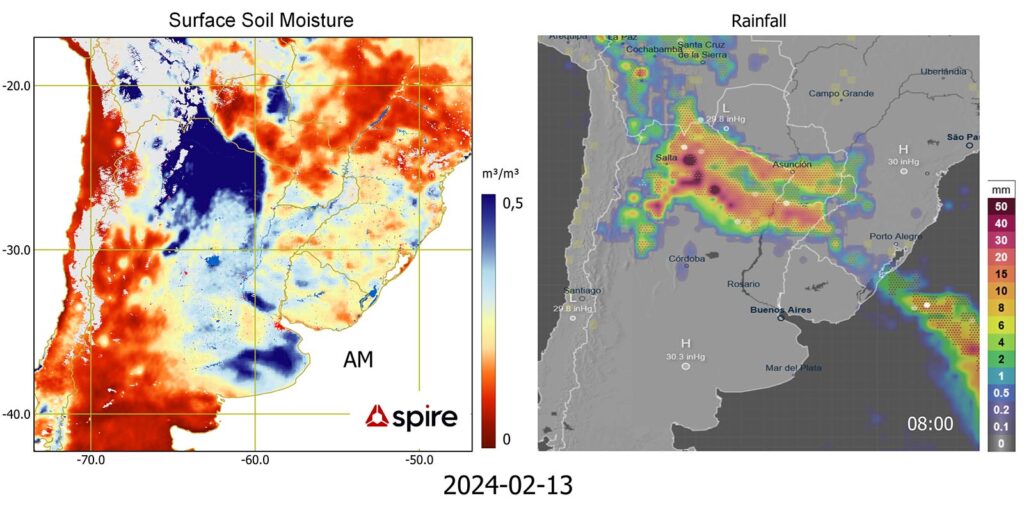
Spire’s surface soil moisture at a 6-km resolution across South America for February 13, 2024 (left) illustrating varied moisture levels. On the right, a rainfall distribution map of the same region, capturing the intensity of precipitation at the time indicated. This juxtaposition highlights the relationship between rainfall and soil moisture levels in different areas.
Adapting to the extremes: From droughts to downpours
- Soil moisture variability directly affects coffee plant health and bean development. Optimal soil moisture can increase bean size and improve quality, whereas conditions of either extreme (too dry or too wet) can degrade these attributes.
- Research indicates that adequate soil moisture can enhance the resilience of coffee plants to pests and diseases, such as coffee leaf rust, which thrives in warmer and wetter conditions.
The resilience of Brazil’s coffee sector is being tested by the extremes of climate. The adaptation strategies, such as drought-resistant coffee plant varieties, advanced irrigation techniques, and the practice of agroforestry, have become essential. These innovations not only mitigate the adverse impacts but also enhance the sector’s sustainability.
Spire’s Soil Moisture Insights: A beacon for precision agriculture
- Precision agriculture technologies, including soil moisture monitoring systems like Spire’s, are growing at a 13% annual rate.
- These technologies help farmers reduce water usage by up to 20% while maintaining or increasing crop yields.
- The World Bank says investments in climate-resilient agriculture could yield benefits 3-8 times the costs.
In this context of climatic unpredictability, Spire’s Soil Moisture Insights emerges as a crucial tool for farmers and agricultural decision-makers. By providing accurate, real-time data on soil moisture levels, these products help in identifying areas of moisture and drought with precision. This information is invaluable for optimizing irrigation practices, effectively conserving water, and ensuring the health and productivity of crops, especially during critical transition periods from drought to wet conditions.
Beyond coffee: A climate nexus in agriculture
- NOAA data shows the past five years as the warmest on record, worsening climate extremes affecting South American agriculture.
- Future models predict more frequent and intense droughts and heavy rainfalls in South America, underscoring the need for precise climate data in agriculture.
The narrative of climate impact extends beyond coffee, affecting a wide range of crops in Southern Brazil and Uruguay. The interconnectedness of agriculture and climate change underscores the need for adaptive strategies and technological innovations. In this regard, Spire’s Weather Data APIs play a pivotal role by offering global weather modeling enhanced with unique space data. This capability enables decision-makers to stay ahead of climate and weather impacts, making informed decisions to safeguard agricultural outputs and economic stability.
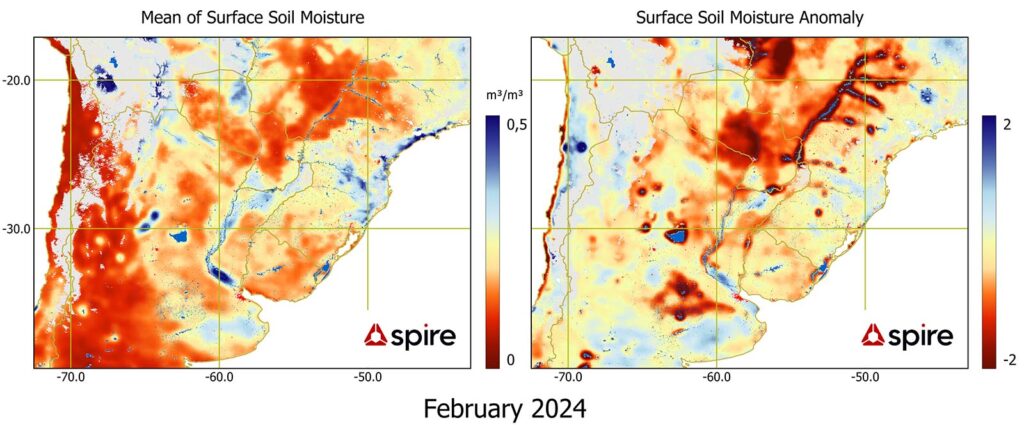
Comparison of surface soil moisture metrics over South America in February 2024: On the left, the monthly mean surface soil moisture content at a 6-km resolution, indicating overall moisture levels. On the right, the soil moisture anomaly map, highlighting deviations from long-term averages, both based on proprietary Spire data. Notably, there is significant soil dryness in regions including the La Plata River Basin.
Embracing technological solutions for future resilience
The integration of Spire’s cutting-edge technologies in agricultural practices promises not only to enhance the resilience for coffee and other crops to climatic stress but also to ensure that the rich agricultural heritage of regions like Southern Brazil and Uruguay continues to thrive. The journey towards climate adaptation in agriculture is complex, yet with tools like Spire’s Soil Moisture Insights and Data APIs, it’s a step closer to sustainability and productivity in the face of a warming climate and more extreme and variable weather.
Explore what makes Spire’s Soil Moisture Insights the preferred choice for global leaders in agriculture, insurance, commodity trading, and environmental management.
 Written by
Written by